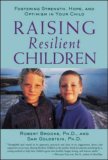Summary | Excerpt | Reviews | Readalikes | Genres & Themes | Author Bio
Fostering Strength, Hope, and Optimism in Your Child

Critics' Opinion:
Readers' Opinion:
First Published:
Apr 2001, 320 pages
Paperback:
Oct 2002, 336 pages
2. Communicating Effectively and Listening Actively
Empathy colors the ways in which we communicate with our children. Communication has many features. It is not simply how we speak with another person. Effective communication involves actively listening to our children, understanding and validating what they are attempting to say, and responding in ways that avoid power struggles by not interrupting them, by not telling them how they should be feeling, by not putting them down, and by not using absolutes such as always and never in a demeaning fashion (e.g., "You never help out"; "You always show disrespect")
Resilient children develop a capacity to communicate effectively aided by parents, who are important models in this process. Mr. Burton's response to Michael's difficulty in completing a radio kit, "I told you it wouldn't work. You don't have enough patience to read the directions carefully," is an example of a message that actually works against the development of a resilient mindset since it contains an accusatory tone. The art of communication has important implications for many components of behaviors associated with resilience, including interpersonal skills, empathy, and problem-solving and decision-making abilities.
3. Changing "Negative Scripts"
The most well-meaning parents have been known to apply the same approach with their children for weeks, months, or years when the approach has proved unsuccessful. For instance, we know of one set of parents who nagged their children for years to clean their rooms, but the children never obeyed. From our discussions with families, it is evident that one of the main reasons parents continue to engage in unproductive behaviors is their belief that children should be the ones to change, not them. However, as many parents can attest, children will "outlast" us in that standoff.
A parent with a resilient mindset recognizes that if something we have said or done for a reasonable time does not work, then we must change our "script" if our children are to change theirs. We must have the insight and courage to think about what we can do differently, lest we become embroiled in useless power struggles.
Often a parent's negative scripts are based on "myths" or excess baggage that we bring from our own childhoods. An example is what occurred in seven-year-old Billy's home when he spilled a glass of milk for the third time in a week. The milk dripped over the counter and onto the floor.
His parents, Mr. and Mrs. Murray, although typically patient, became annoyed. His father said tersely, "Why can't you be less clumsy! You just don't seem to think about what you're doing."
Billy was hurt and embarrassed. He had not intentionally spilled the milk; it just happened. He promised his parents that it would not happen again and that he would be more careful. Yet, the next day, Billy spilled some juice.
Mrs. Murray took away the juice and said, "I hope that helps you to remember to hold your glass right!"
If Billy's parents had been aware of the significant temperamental differences among children, they might not have interpreted his continually spilling drinks as a sign of careless, willful, or oppositional behavior and might not have responded with punishment. A change in mindset would allow Mr. and Mrs. Murray to appreciate what hindered Billy from holding his glass and perhaps change their approach, including providing him a glass with a cover.
When parents change their own scripts, it does not imply "giving in to" or "spoiling" children; rather, it serves to teach youngsters that there are alternative ways of solving problems. If anything, it helps children learn to be more responsible and more accountable in handling difficult situations.
4. Loving Our Children in Ways That Help Them to Feel Special and Appreciated
Copyright © 2001 Robert Brooks and Sam Goldstein





The Flower Sisters
by Michelle Collins Anderson
From the new Fannie Flagg of the Ozarks, a richly-woven story of family, forgiveness, and reinvention.

The House on Biscayne Bay
by Chanel Cleeton
As death stalks a gothic mansion in Miami, the lives of two women intertwine as the past and present collide.

The Funeral Cryer by Wenyan Lu
Debut novelist Wenyan Lu brings us this witty yet profound story about one woman's midlife reawakening in contemporary rural China.
Your guide toexceptional books
BookBrowse seeks out and recommends the best in contemporary fiction and nonfiction—books that not only engage and entertain but also deepen our understanding of ourselves and the world around us.